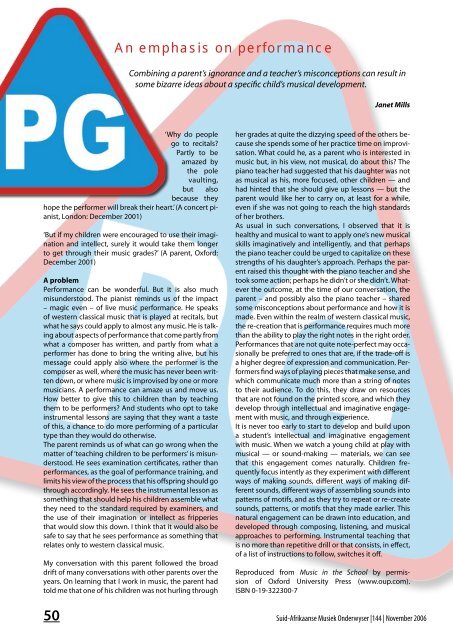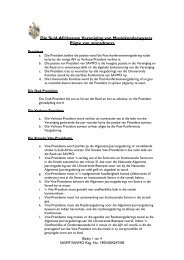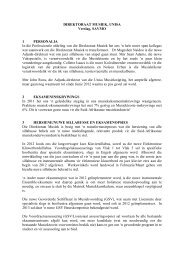2006 Edition 2 (Issue 144) - Sasmt-savmo.org.za
2006 Edition 2 (Issue 144) - Sasmt-savmo.org.za
2006 Edition 2 (Issue 144) - Sasmt-savmo.org.za
You also want an ePaper? Increase the reach of your titles
YUMPU automatically turns print PDFs into web optimized ePapers that Google loves.
An emphasis on performance<br />
Combining a parent’s ignorance and a teacher’s misconceptions can result in<br />
some bi<strong>za</strong>rre ideas about a specific child’s musical development.<br />
‘Why do people<br />
go to recitals?<br />
Partly to be<br />
amazed by<br />
the pole<br />
vaulting,<br />
but also<br />
because they<br />
hope the performer will break their heart.’ (A concert pianist,<br />
London: December 2001)<br />
‘But if my children were encouraged to use their imagination<br />
and intellect, surely it would take them longer<br />
to get through their music grades?’ (A parent, Oxford:<br />
December 2001)<br />
A problem<br />
Performance can be wonderful. But it is also much<br />
misunderstood. The pianist reminds us of the impact<br />
– magic even – of live music performance. He speaks<br />
of western classical music that is played at recitals, but<br />
what he says could apply to almost any music. He is talking<br />
about aspects of performance that come partly from<br />
what a composer has written, and partly from what a<br />
performer has done to bring the writing alive, but his<br />
message could apply also where the performer is the<br />
composer as well, where the music has never been written<br />
down, or where music is improvised by one or more<br />
musicians. A performance can amaze us and move us.<br />
How better to give this to children than by teaching<br />
them to be performers? And students who opt to take<br />
instrumental lessons are saying that they want a taste<br />
of this, a chance to do more performing of a particular<br />
type than they would do otherwise.<br />
The parent reminds us of what can go wrong when the<br />
matter of ‘teaching children to be performers’ is misunderstood.<br />
He sees examination certificates, rather than<br />
performances, as the goal of performance training, and<br />
limits his view of the process that his offspring should go<br />
through accordingly. He sees the instrumental lesson as<br />
something that should help his children assemble what<br />
they need to the standard required by examiners, and<br />
the use of their imagination or intellect as fripperies<br />
that would slow this down. I think that it would also be<br />
safe to say that he sees performance as something that<br />
relates only to western classical music.<br />
My conversation with this parent followed the broad<br />
drift of many conversations with other parents over the<br />
years. On learning that I work in music, the parent had<br />
told me that one of his children was not hurling through<br />
Janet Mills<br />
her grades at quite the dizzying speed of the others because<br />
she spends some of her practice time on improvisation.<br />
What could he, as a parent who is interested in<br />
music but, in his view, not musical, do about this? The<br />
piano teacher had suggested that his daughter was not<br />
as musical as his, more focused, other children — and<br />
had hinted that she should give up lessons — but the<br />
parent would like her to carry on, at least for a while,<br />
even if she was not going to reach the high standards<br />
of her brothers.<br />
As usual in such conversations, I observed that it is<br />
healthy and musical to want to apply one’s new musical<br />
skills imaginatively and intelligently, and that perhaps<br />
the piano teacher could be urged to capitalize on these<br />
strengths of his daughter’s approach. Perhaps the parent<br />
raised this thought with the piano teacher and she<br />
took some action; perhaps he didn’t or she didn’t. Whatever<br />
the outcome, at the time of our conversation, the<br />
parent – and possibly also the piano teacher – shared<br />
some misconceptions about performance and how it is<br />
made. Even within the realm of western classical music,<br />
the re-creation that is performance requires much more<br />
than the ability to play the right notes in the right order.<br />
Performances that are not quite note-perfect may occasionally<br />
be preferred to ones that are, if the trade-off is<br />
a higher degree of expression and communication. Performers<br />
find ways of playing pieces that make sense, and<br />
which communicate much more than a string of notes<br />
to their audience. To do this, they draw on resources<br />
that are not found on the printed score, and which they<br />
develop through intellectual and imaginative engagement<br />
with music, and through experience.<br />
It is never too early to start to develop and build upon<br />
a student’s intellectual and imaginative engagement<br />
with music. When we watch a young child at play with<br />
musical — or sound-making — materials, we can see<br />
that this engagement comes naturally. Children frequently<br />
focus intently as they experiment with different<br />
ways of making sounds, different ways of making different<br />
sounds, different ways of assembling sounds into<br />
patterns of motifs, and as they try to repeat or re-create<br />
sounds, patterns, or motifs that they made earlier. This<br />
natural engagement can be drawn into education, and<br />
developed through composing, listening, and musical<br />
approaches to performing. Instrumental teaching that<br />
is no more than repetitive drill or that consists, in effect,<br />
of a list of instructions to follow, switches it off.<br />
Reproduced from Music in the School by permission<br />
of Oxford University Press (www.oup.com).<br />
ISBN 0-19-322300-7<br />
0 Suid-Afrikaanse Musiek Onderwyser |<strong>144</strong> | November <strong>2006</strong>




